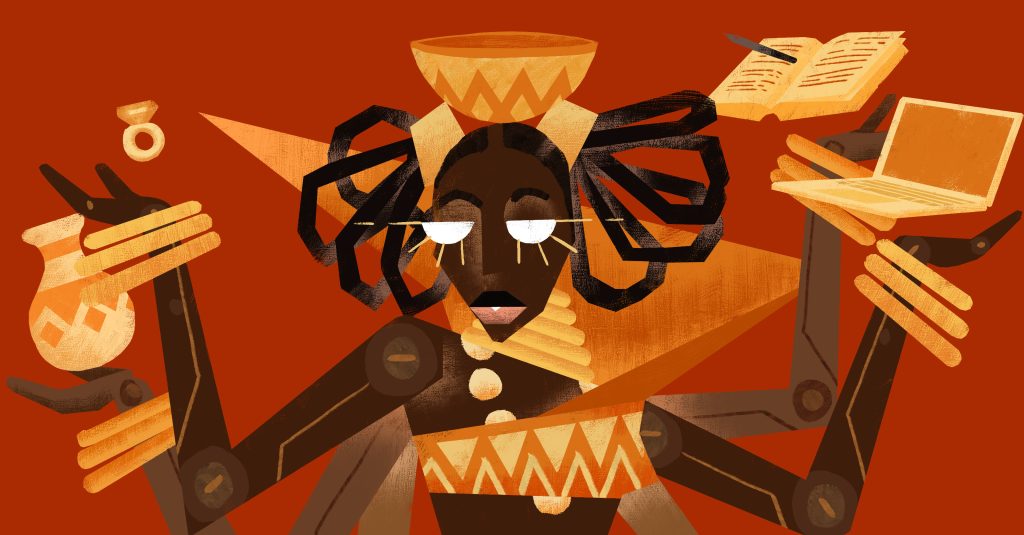
Illustration by Charles Owen / THE REPUBLIC.
THE MINISTRY OF ARTS / BOOKS DEPT.
Black Scholarship in Africanfuturism

Illustration by Charles Owen / THE REPUBLIC.
THE MINISTRY OF ARTS / BOOKS DEPT.
Black Scholarship in Africanfuturism
Death of the Author (2025) by Nnedi Okorafor is a novel that crosses genres—metafiction, literary fiction and science fiction (africanfuturism) all wrapped up in one piece of work. Presenting a book-within-a-book narrative, Death of the Author is about Zelu, a disabled Nigerian-American woman who seeks to make a breakthrough in her writing career while dealing with her outcast position within her family. Zelu has an unrewarding job as a creative writing professor and deals with a constant familial pressure to get married. At the lowest point in her life—with no job, no marriage prospects and a book that has been rejected several times by publishers—Zelu pens another book, Rusted Robots, that skyrockets her into fame overnight.
Death of the Author’s blurb refers to Zelu’s book, Rusted Robots, as a ‘far-future epic [set in Lagos, Nigeria] where androids and AI rage war in the grown-over ruins of human civilization.’ However, after Rusted Robots is published, Zelu is forced to navigate several situations that come with gaining literary stardom: an overwhelming online presence, her influence as an author, the generosity and life-changing opportunities from white billionaires, backlash about ableism when she dons on prosthetic legs, a whitewashed movie adaptation of her novel, almost getting kidnapped in Nigeria and the pressure to write a sequel. She additionally deals with personal situations that further complicate her life: her father’s death, getting married and travelling to space while pregnant.
AN ANDROID AND AN AI SURVIVE AN APOCALYPTIC NIGERIA
Though Death of the Author deals with a variety of themes at once—disability, cultural stereotypes, whiteness, the influence of social media, the significance of water and double consciousness as a Nigerian-American—it is the novel’s discussion on artificial intelligence (AI) and its conversation with Black scholarship and africanfuturism that brings it into focus. And this begins, especially, with Zelu’s book, Rusted Robots, which explores the relationship between a humanoid robot named Ankara and an AI named Ijele. Rusted Robots depicts the transformation of their initial enmity into a collaboration to save the Earth from extraterrestrial threats.
This collaboration is significant because Ankara resembles a real-life human while Ijele mirrors the rapidly developing non-physical AI (like Alexa, Siri, etc.) of the real world; their initial enmity is a clear mirroring of the current fears and anxieties humans have about artificial intelligence. Even more significantly, Rusted Robots decenters Western narratives and perspectives that deal with humans and AI by having Zelu, a Black author, pen the novel, with its plot situated in Nigeria. As a result, Okorafor provides newer directions towards imagining a post-racial and post-humanist future that caters to every being on this planet, organic or otherwise.
However, Rusted Robots is more than just a novel written by a Black author; it is a reflection on humanity, venturing beyond the concept of race and corporeality, both of which are characteristics personal to Zelu’s life: being disabled from the waist down and having a Nigerian-American identity that distances her from her family’s ties with the mainland. In turn, Death of the Author is transformed into an intellectual discourse between a Black author’s work and their very life. As Zelu notes:
The rusted robots in the story were a metaphor for wisdom, patina, acceptance, embracing that which was you, scars, pain, malfunctions, needed replacements, mistakes. What you were given. The finite. Rusted robots did not die in the way that humans did, but they celebrated mortality. (p. 64).
shop the republic
Reconciling Black scholarship, through science fiction, with intellectual prowess, mental resilience and emotional capabilities proves that scientific development does not exclusively exist outside literature or within the United States. Zelu’s Nigerian-American identity allows her to bridge gaps between the Western and the African, which successively cements Okorafor’s own influence as a writer. To emphasize this importance of Black scholarship, Okorafor explores it through an Americanized movie adaptation of Zelu’s novel that leaves Zelu in disbelief. To make matters worse, Zelu’s fans start liking the movie more than the novel, with newer fans relying exclusively on the movie to write fanfiction and create fan art. With the plot of Rusted Robots relocated to a post-apocalyptic USA and Ankara and Ijele renamed Yankee and Dot respectively, Okorafor showcases how Africa is continuously hindered by the United States, and by extension Western imperialism, from progressing in its scholarship or thought.
Zelu despairs at how she would ‘have to actively write against the assumption that her characters were Americans with American accents’ (p. 231) for her second book. Okorafor utilizes the Rusted Robot movie’s (mal)adaptation to point out the continued discrimination, racism and incorrect interpretations that Black scholars and authors face on a daily basis. Okorafor’s deliberate showcasing of the novel’s misleading movie adaptation is essential in recognizing the importance africanfuturism holds as a literary genre and why it is still not regarded as highly as it should be. Having Rusted Robots set in Nigeria helps Zelu return to a sense of constancy familiar to her: Nigeria itself. Zelu explains that ‘something in our blood made us love the land, the people, the cultures, the traditions, unconditionally’ (p. 302). This speaks to africanfuturism’s defining feature, in that its stories are located in the African continent.
As Okorafor points out in her blog post, ‘Africanfuturism: Defined’, africanfuturism’s ‘default is non-western; its default/centre is African.’ This genre functions on ideas, values and virtues intrinsic to African cultures, and this is evident in Rusted Robots, with the presence of the spider-shaped, all-knowing community (elder) robot, Udide, and the wise, eccentric and only remaining human in the world, Ngozi. According to Okorafor, africanfuturism is ‘rooted in Africa and then it branches out to embrace all blacks of the Diaspora’, and we see this in Rusted Robots, which is similarly rooted in Nigeria and then branches out to people all over the world through the medium of Death of the Author. As a result, Rusted Robots, through its africanfuturist storytelling, renders the Black body and its literature global. By effect, Rusted Robots also defines Death of the Author as a palimpsest of an africanfuturist novel, with its core values borrowed from Nigeria’s Yoruba and Igbo cultures that both ultimately shape Zelu and her ancestry.
shop the republic
shop the republic
shop the republic
-
‘The Empire Hacks Back’ by Olalekan Jeyifous by Olalekan Jeyifous
₦70,000.00 – ₦75,000.00Price range: ₦70,000.00 through ₦75,000.00 This product has multiple variants. The options may be chosen on the product page -
‘Make the World Burn Again’ by Edel Rodriguez by Edel Rodriguez
₦70,000.00 – ₦75,000.00Price range: ₦70,000.00 through ₦75,000.00 This product has multiple variants. The options may be chosen on the product page -
‘Nigerian Theatre’ Print by Shalom Ojo
₦150,000.00 -
‘Natural Synthesis’ Print by Diana Ejaita
₦70,000.00 – ₦75,000.00Price range: ₦70,000.00 through ₦75,000.00 This product has multiple variants. The options may be chosen on the product page
AFRICAN AGENCY, AFRICAN CULTURE, AFRICAN HISTORY, AFRICANFUTURISM
In relation to Okorafor’s previous works, Death of the Author holds a lot of significance in imparting agency to its readers, particularly Black readers who want to explore africanfuturism. This sentiment is exemplified in Okorafor’s 2017 TED Talk, where she explains the significance of Black scholarship in science fiction literature via her most seminal work, the Binti trilogy (2015–2018): ‘Binti leaves the planet to seek education from extraterrestrials. She goes out as she is, looking the way she looks, carrying her cultures, being who she is.’ What inspired Okorafor was not the classic science fiction narratives produced by dominant figures like Isaac Asimov, Jules Verne, H.G. Wells, George Orwell and Robert Heinlein. To Okorafor, such ‘stories [were] preoccupied with xenophobia, colonization and seeing aliens as others. And [Okorafor] saw no reflection of anyone who looked like [her] in those narratives.’ Instead, she was inspired to write africanfuturist novels ‘because of blood that runs deep, family, cultural conflict and the need to see an African girl leave the planet on her own terms. [Okorafor’s] science fiction had different ancestors, African ones.’
As a result, Okorafor’s success goes beyond the Hugo and Nebula awards—awards that mark the epitome of success in the science fiction and fantasy genre—because she disrupts a realm of literature that is ‘Western-rooted … mostly white and male’, while championing herself as a disabled, Black woman who can wield her culture to (re)write science fiction stories. Okorafor’s works throw new light on the African continent and the stories that the continent has to tell about the world’s future. Just as Binti and her journey impart agency to the reader, particularly for imagining and believing in stories unlike the ones Okorafor grew up with, Zelu’s life holds inspiration for everyday Black people, particularly for fighting for a world that both challenges and accepts them.
While Rusted Robots interrogates the future of humanity from a robot and AI’s worldview, Death of the Author reimagines what it means to be human through the mirror of self-reflection. As Okorafor says in her TED Talk, ‘African science fiction’s blood runs deep, and it’s old, and it’s ready to come forth’, so, Okorafor’s writing brings in new dimensions of Black literature that imagines a (Black) future on its own terms, while moving the masses to bring such an imagined future to reality.
At large, Death of the Author is an attempt at resolving the issues between science and race by incorporating the past (colonialism, slavery, migration) as well as the future (technology, post-racism, post-humanism). The novel, though, does elicit some questions about furthering this resolution in practice; for example, Okorafor is not critical enough when it comes to the novel’s direct engagement with whiteness. On multiple occasions, whiteness as an institution benefits Zelu at the expense of her social and cultural standing, and Okorafor does little to explain the harmful consequences Black people face due to ‘white’ agency as well as the dehumanization of Black subjects in scientific experiments. However, the novel ultimately surmounts as ‘a surprisingly cutting, yet heartfelt drama about art and love, identity and connection, and, ultimately, what makes us human.’ To conclude, Death of the Author advances Black scientific and science fiction scholarship, particularly for current discourses on AI and their place in society⎈
DEATH OF THE AUTHOR
NNEDI OKORAFOR
448 PP. WILLIAM MORROW, JANUARY 2025
UNITED STATES OF AMERICA
BUY THE MAGAZINE AND/OR THE COVER
-
‘Make the World Burn Again’ by Edel Rodriguez by Edel Rodriguez
₦70,000.00 – ₦75,000.00Price range: ₦70,000.00 through ₦75,000.00 This product has multiple variants. The options may be chosen on the product page -
The Republic V9, N2 Who Dey Fear Donald Trump? / Africa In The Era Of Multipolarity
₦40,000.00
















